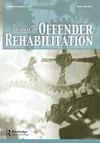工作、支持与孤独:囚犯的克制期望与自我调节策略
IF 1.1
Q3 SOCIAL WORK
引用次数: 6
摘要
摘要本文探讨了囚犯如何计划实现犯罪中止。在许多方面,囚犯获释后前景不佳。囚犯重返社会的机会可能会受到结构性障碍、缺乏社会支持和监禁后遗症等条件的阻碍。对囚犯进行定性访谈(N = 45),这项分析表明,大多数囚犯都有乐观的期望,并制定了具体的退出计划。为了实现这一期望的改变,囚犯们打算使用三种自我调节策略;确保工作或其他日常事务,寻求他人帮助,并改变周围环境。即使工作、支持和独处是摆脱犯罪的可行策略,本文也认识到,由于固有的不确定性和薄弱的实施意图,这些自我调节策略可能会失败。本文章由计算机程序翻译,如有差异,请以英文原文为准。
Work, support and solitude: prisoners’ desistance expectations and self-regulating strategies
Abstract This article explores how prisoners plan to achieve desistance from crime. In many respects, prisoners have poor prospects upon their release. A prisoner’s chances of reintegration can be hindered by conditions such as structural barriers, lack of social support, and the after-effects of imprisonment. Using qualitative interviews with prisoners (N = 45) who were serving at open low-security prisons in Finland, this analysis demonstrates that the majority of the prisoners had optimistic expectations and devised concrete plans for desistance. To achieve this desired change, the prisoners intended to use three self-regulating strategies; to secure employment or another daily routine, to seek help from others, and to shift surroundings. Even if work, support, and solitude are viable strategies for achieving desistance from crime, this article recognizes the risk of these self-regulating strategies failing due to inherent uncertainties and weak implementation intentions.
求助全文
通过发布文献求助,成功后即可免费获取论文全文。
去求助
来源期刊

Journal of Offender Rehabilitation
SOCIAL WORK-
CiteScore
1.60
自引率
0.00%
发文量
24
期刊介绍:
The Journal of Offender Rehabilitation is a multidisciplinary journal of innovation in research, services and programs in criminal justice and corrections. The journal is an essential professional resource for practitioners, educators and researchers who work with individuals involved in the criminal justice system and study the dynamics of rehabilitation and individual and system change. Original research using qualitative or quantitative methodology, theoretical discussions, evaluations of program outcomes, and state of the science reviews will be considered.
 求助内容:
求助内容: 应助结果提醒方式:
应助结果提醒方式:


